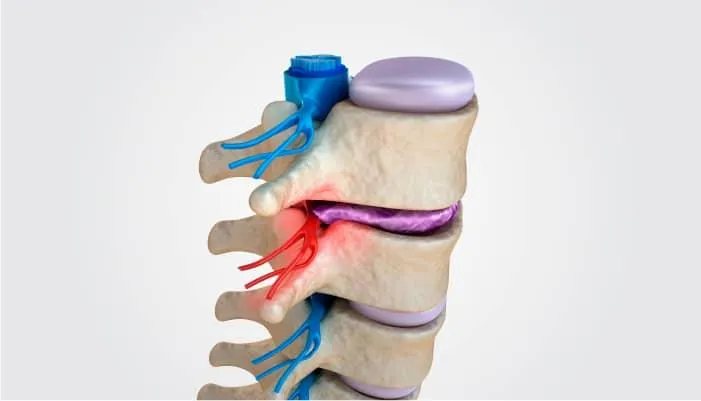Is a Disc Prolapse Causing Back Ache?
November 15, 2022
Most people experience different types of back pain at some point in their lives. While lower back pain is relatively common due to poor ergonomics and sedentary lifestyles, it may occur for various reasons. One reason for lower back ache is a prolapsed or herniated disc. This condition is more common among young and middle-aged adults.
What is a prolapsed disc?
A prolapsed disc refers to a condition that affects the cushion-like disc between two vertebrae. The disc is soft and has a jelly-like consistency surrounded by a tough exterior. A prolapsed disc occurs when the disc's outer fibres are injured, and the soft inner material (called the nucleus pulposus) pushes through the tear.
Disc prolapse can occur in any part of the spine but most often occurs in the lower back region. While the ruptured disc can enter the spinal cord, it most often impinges on the spinal nerves, resulting in pain, numbness, tingling sensation and weakness in the arms or legs.
A prolapsed or herniated disc can occur suddenly or gradually over a few weeks or months.
What are the symptoms of prolapsed disc?
The symptoms depend on the part of the affected spine and the nerves that get pressed. Though most prolapsed disc conditions occur in the lower back, they may sometimes also affect the neck. Prolapsed discs usually affect one side of the body.
A few common symptoms of a disc prolapse are:
-
Pain in arms or legs: When the prolapsed disc occurs in the lower back, it may cause arm or leg pain, pain in the thighs, calves, and buttocks, apart from lower back pain. Some people may also have pain in their feet.
-
Pain in shoulders or arms: If the prolapse has occurred in the neck region, people may experience pain in their shoulders and arm. The pain is often described as burning or sharp shooting.
-
Numbness or tingling: A prolapsed disc that presses on a nerve may cause radiating numbness and tingling sensation in the part of the body attached to the affected nerves.
-
Weakness: When a prolapsed disc presses on the nerves, the muscles supplied by these nerves become weak, affecting the individual’s ability to walk, lift or hold objects.
Many individuals with prolapsed discs may not experience symptoms, and the condition only comes to light on a routine x-ray.
In severe cases of disc prolapse, bladder or bowel control loss, numbness in the genital area and fertility issues may occur. People experiencing one or more of these symptoms must visit their doctor for an evaluation.
What are the causes and risk factors of a prolapsed disc?
The most common cause for disc prolapse is gradual wear over time. As one ages, the intervertebral discs become drier, weaker, and less flexible, increasing the risk of prolapse with a minor strain or twist.
Other factors that may lead to prolapse include:
-
Medical conditions like spinal stenosis
-
Connective tissue disorders
-
Severe injury
-
Using back muscles instead of the legs to lift heavy objects
-
A blow to the back
-
Exercising too hard
Though a prolapsed disc is a relatively common condition, a few factors that may increase an individual’s risk of developing it include:
-
Being overweight or obese puts extra stress on the discs in the lower back
-
People who work in physically demanding jobs that involve repeated pushing, pulling or lifting
-
Genetic predisposition
-
Smoking reduces the oxygen supply to the discs, causing them to break down quickly
-
Sedentary lifestyle and lack of exercise
-
Being seated for long periods of time and the vibration of motor vehicles among people who work as drivers
How is prolapsed disc diagnosed?
A prolapsed disc is diagnosed using a combination of clinical evaluation and imaging tests. If the doctor suspects a disc prolapse based on the individual’s signs and symptoms, they will evaluate the following:
-
Reflexes
-
Muscle strength
-
Walking ability
-
Ability to touch and feel vibrations, pinpricks etc.
A few imaging tests may be advised, which include:
-
X-rays of the affected region
-
CT scan
-
MRI
-
Myelogram
-
EMG (electromyography)
-
Nerve conduction study
How is a prolapsed disc treated?
The first line of treatment for a prolapsed disc is conservation. This includes modifying movements that cause pain, pain-relieving medications and physiotherapy.
Common medications used to relieve symptoms of a disc prolapse include:
-
OTC pain-relieving medications
-
Neuropathic drugs that decrease nerve impulses and subsequently decrease pain
-
Muscle relaxants
-
Opioids (these are prescribed when other pain medications do not work)
-
Cortisone injections (recommended when oral painkillers do not reduce pain)
Few people with prolapsed discs require surgery, which is often recommended when conservative treatments fail.
Other recommendations on how to cure back pain fast at home include:
-
Bed rest
-
Weight control
-
Physiotherapist-guided exercises
-
Using a lumbosacral back support
-
Massaging
-
Regular practice of yoga
Around 80 to 90% of prolapsed disc cases settle in a few weeks, and the symptoms resolve by themselves.
The bottom line
Since backaches are so common, most people ignore them and continue their routine. However, if the back pain is due to a prolapsed disc, getting it evaluated and treated by a professional is essential to avoid complications like worsening symptoms, bladder or bowel dysfunction and saddle anaesthesia. Visit the nearest orthopaedic to learn more about the causes and how to reduce back pain.
Dr. Utkarsh Prabhakar Pawar
MBBS, MS, DNB...
| Experience | : | 5 Years |
|---|---|---|
| Speciality | : | Orthopaedics and Trauma |
| Location | : | Mumbai-Chembur |
| Timings | : | Mon - Sat : 1:00 PM to 3:00 PM |
Dr. Kailash Kothari
MD,MBBS,FIAPM...
| Experience | : | 23 Years |
|---|---|---|
| Speciality | : | Orthopaedics and Trauma |
| Location | : | Mumbai-Chembur |
| Timings | : | Mon - Sat : 3:00 PM to 8:00 PM |
Dr. Om Parshuram Patil
MBBS, MS – Orthopaedics, FCPS (Ortho), Fellowship in Spine...
| Experience | : | 21 Years |
|---|---|---|
| Speciality | : | Orthopaedics and Trauma |
| Location | : | Mumbai-Chembur |
| Timings | : | Mon - Fri : 2:00 PM to 5:00 PM |
Dr Ranjan Burnwal
MS - Orthopedics...
| Experience | : | 10 Years |
|---|---|---|
| Speciality | : | Orthopaedics and Trauma |
| Location | : | Mumbai-Chembur |
| Timings | : | Mon - Sat: 11:00 AM to 12:00 PM & 6:00 PM to 7:00 PM |
Dr. Sudhakar Williams
MBBS, D. Ortho, Dip. Ortho, M.Ch...
| Experience | : | 34 Years |
|---|---|---|
| Speciality | : | Orthopaedics and Trauma |
| Location | : | Chennai-MRC Nagar |
| Timings | : | Tue & Thur : 9:00 AM to 10:00 PM |
While most people would like to avoid walking, it is good for those with a prolapsed disc as it prevents muscle stiffness and allows you to return to your regular activities quicker. Excessive pain may, however, make it difficult to walk.
When a prolapsed disc presses on a nerve in n the spine, one may feel pain running down their hip and leg (called sciatica). Some people may experience lower back pain or a 'pins and needles' feeling on their legs.
NOTICE BOARD
CONTACT US
CONTACT US
 Book Appointment
Book Appointment








.svg)
.svg)
.svg)
.svg)








